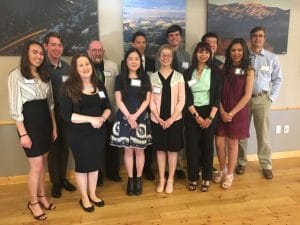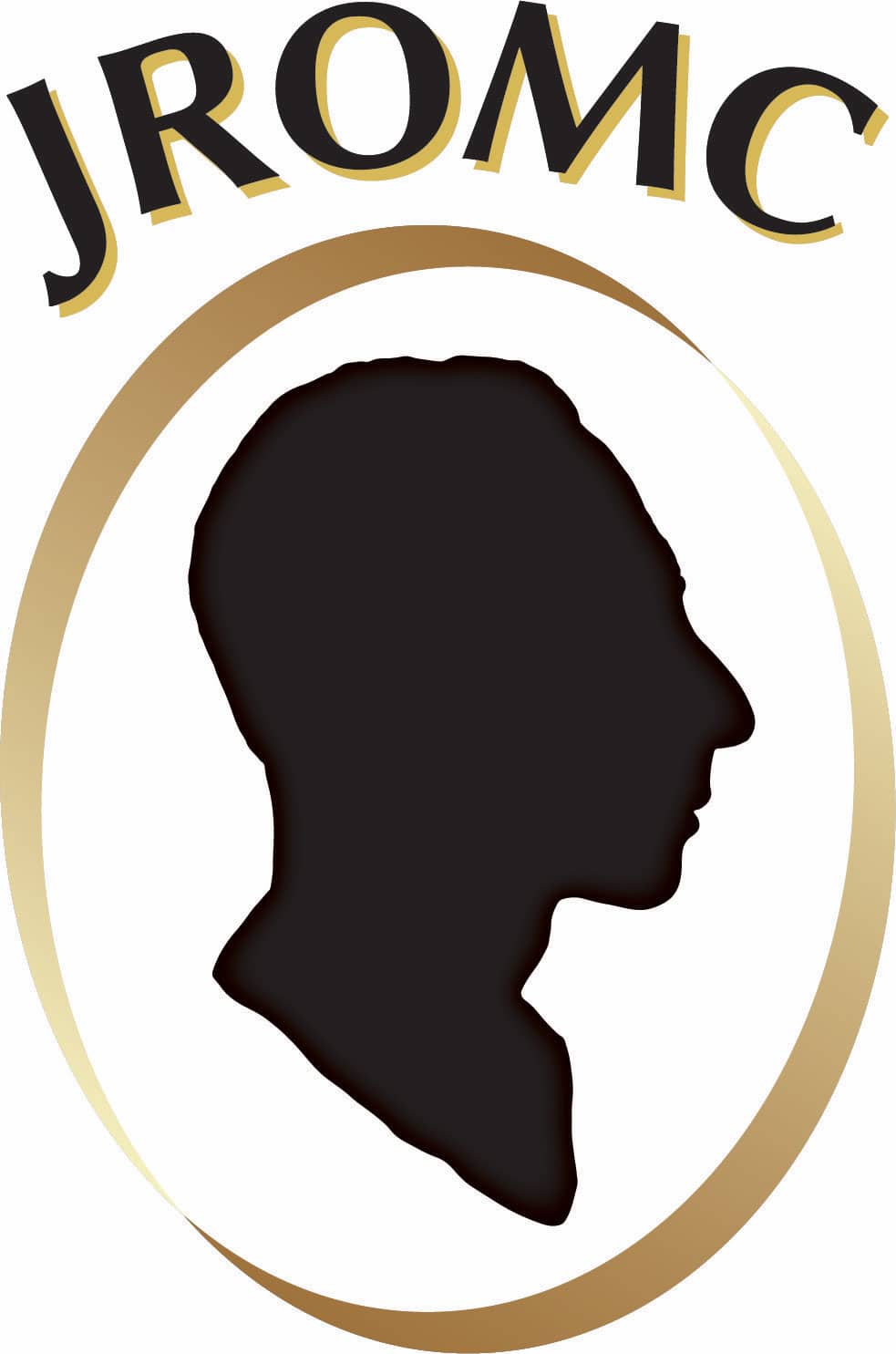
The Memorial Lecture is an annual lecture series hosted by the JROMC. The annual lecture was established in 1972 and was given by the American diplomat and Pulitzer Prize winner George Kennan. Since that time, the lecture series has been honored by many distinguished scientists, Nobel Laureates, and other exceptional members of society, including Hans Bethe, Linus Pauling, I.I. Rabi, Rosalyn Yalow, James Watson, Virginia Trimble, Frank Wilczek, Paul Nurse, Harold Varmus, Marcia McNutt, and Kip Thorne.
In addition to a yearly lecture by a noted speaker, our Committee also hosts a dinner the evening before the event where our speaker, JROMC scholarship winners, their families, and notable guests are invited to inspire our youth toward worthwhile achievements.
The photograph shows our 2019 JROMC Scholarship winners with Nobel Laureate Prof. Kip Thorne, the 2019 JROMC Memorial Lecture speaker, Dr. Thom Mason, Director of Los Alamos National Laboratory, and Dr. Alison Pugmire, JROMC Chair.
2023 – Professor Jennifer Lewis, Harvard University
Printing Soft Objects and Functional Tissues
2022 – Professor Feryal Özel, Georgia Institute of Technology
Black Holes: from Oppenheimer’s Ideas to the First Direct Images
2020 and 2021 Lectures canceled due to COVID-19 pandemic.
2019 – Kip Thorne, California Institute of Technology
A Brief History of Black Holes: From Oppenheimer to LIGO
2018 – J. Michael Kosterlitz, Brown University
A Random Walk Through Physics to the Nobel Prize
2016 – Marcia McNutt, President of the National Academy of Sciences
Climate Intervention: A Last Resort?
2015 – Alan Guth, Massachusetts Institute of Technology
Inflationary Cosmology: Is Our Universe Part of a Multiverse?
2014 – Harold Varmus, Director, National Cancer Institute
The History and Future of Cancer Research
2013 – Steven Squyres, Cornell University
Roving Mars: Spirit, Opportunity, and the Exploration of the Red Planet
2012 – Alex Filippenko, University of California, Berkeley
Dark Matter and the Runaway Universe
2011 – Sir Paul Maxime Nurse, President of the Royal Society
Great Ideas of Biology
2010 – Ahmed H. Zewail, California Institute of Technology
Mysteries and Miracles of Time
2009 – Jeff Hawkins, Redwood Center for Theoretical Neuroscience
Why Can’t A Computer Be More Like a Brain
2008 – Martin J. Sherwin, 2006 Pulitzer Prize Winner for Biography, George Mason University
Oppenheimer’s Shadow: His Nuclear World and Ours
2007 – Joel R. Primack, University of California, Santa Cruz
View from the Center of the Universe
2006 – Julie Louise Gerberding, Director of the Centers for Disease Control and Prevention
21st Century Health Protection Challenges: Preparing for Pandemics
2005 – Christof Koch California Institute of Technology
The Quest for Consciousness: A Neurobiological Approach
2004 – Frank Wilczek, Massachusetts Institute of Technology
The World’s Numerical Recipe
2003 – Peter H. Raven, Missouri Botanical Garden
Global Sustainability: Realistic Goal or Troublesome Illusion?
2002 – Virginia Trimble, University of California, Irvine and University of Maryland
Cosmology: Man’s Place in the Universe
2001 – William B. F. Ryan, Columbia University
Noah’s Flood: The New Scientific Discoveries About the Event That Changed History
2000 – Samuel H. Barondes, University of California, San Francisco
A Hundred Years of Psychiatry
1999 – James D. Watson, Cold Spring Harbor Laboratory
From the Double Helix to the Human Genome Project
1999 – Mario J. Molina, Massachusetts Institute of Technology
The Antarctic Ozone Hole
1998 – Edward O. Wilson, Harvard University
The Diversity of Life (this lecture was cancelled)
1997 – Edward W. ‘Rocky’ Kolb, Fermi National Accelerator Laboratory and University of Chicago
Primordial Soup of the Big Bang
1996 – Robert Sokolowski, Catholic University of America
Los Alamos as a Project in Philosophy
1995 – David Hawkins, University of Colorado
Science Education: Some Roots and Branches
1994 – Harold W. Lewis, University of California Santa Barbara
Risk, Mathematics and Physics
1993 – Serguei P. Kapitza, Russian Academy of Sciences
Our Nonlinear World
1992 – Nicholas C. Metropolis, Los Alamos National Laboratory
Random Reminiscences
1991 – Jessica Tuchman Mathews, World Resources Institute
Nations and Nature: A New Look at Global Security
1990 – Wilson Hurley, Albuquerque, New Mexico
Creativity and Chaos
1989 – Leon M. Lederman, Fermi National Accelerator Laboratory
The Quark and the Cosmos
1988 Freeman J. Dyson, Institute for Advanced Studies
Six Cautionary Tales for Scientists
1988 – Guriy I. Marchuk, USSR Academy of Sciences(Presented by Kirill IA. Kondratiyev, USSR Academy of Sciences)
Global Problems of Ecology and the Future
1987 – Edward C. Stone, California Institute of Technology
Voyager Exploration of the Outer Solar System
1986 – William A. Fowler, California Institute of Technology
How Old is the Observable Universe: A Biased Answer
1985 – John A. Wheeler, University of Texas
Legacy of Niels Bohr
1984 – Robert Coles, Harvard University
Children and the Nuclear Bomb
1983 – Rosalyn S. Yalow, Yeshiva University
Radioactivity in the Service of Mankind
1982 – Lewis Thomas, Memorial Sloan-Kettering Cancer Center
Things Unflattened by Science
1981 – Chen Ning Yang, State University of New York
Albert Einstein and Contemporary Physics
1980 – Philip Morrison, Massachusetts Institute of Technology
Lilliput, Brobdingnag and Los Alamos: Scale in Nature and Society
1979 – Murray Gell-Mann, California Institute of Technology
Quarks and Other Fundamental Building Blocks of Matter
1978 – S. Chandrasekhar, University of Chicago
Einstein and General Relativity; Historical Perspectives
1977 – Daniel Bell, Harvard University
Return of the Sacred
1976 – Robert R. Wilson, Fermi National Accelerator Laboratory
Science and the Human Spirit
1975 – Hans A. Bethe, Cornell University
Science and Scientists in Government
1974 – I. I. Rabi, Columbia University
Can Mankind Survive its Powers? Why Scientists Feel Special Obligations
1973 – Linus C. Pauling, Stanford University
Science in Modern Life
1972 – George F. Kennan, Institute for Advanced Study
Environmental Predicament and its Political Implication
